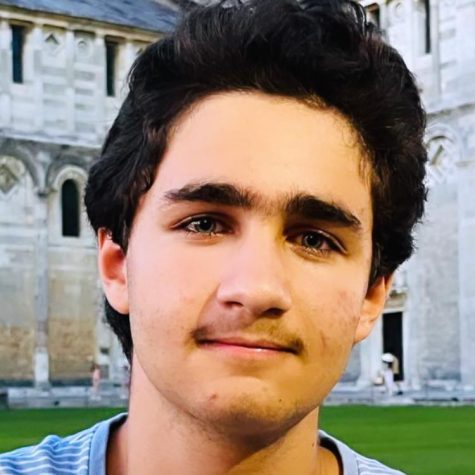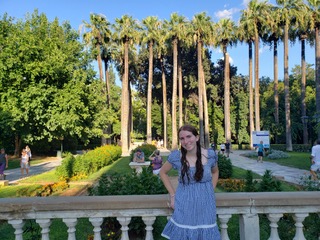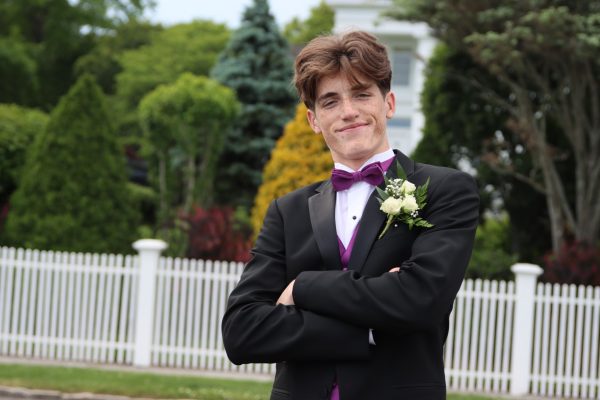On Saturday, October 7, Hamas militants based in Gaza crossed over into southern Israel in a full scale invasion, in what the world instantly condemned as a terrorist attack of massive proportions on innocent civilians. We at the Prospect covered this event, like any other news story, but this one holds more weight than just any news story. The issue of Middle-East peace (including the ‘Israeli-Palestinian conflict’ as it has been coined) has become one of incredible nuance, complexity, and emotional difficulty for the international community. In the last week, it has also touched our national community in the United States, and even in our local community of Fairfield.
Our editors and writers strive to look at every issue from a neutral and impartial standpoint, one of the most important aspects of journalism, whether student or professional. But it is hard to be impartial in the shadow of endless civilian casualties and terroristic atrocities.
At its core, journalism provides ‘the plain facts’ to people in our community to allow for the making and building of their opinions. However, today, The FLHS Prospect’s Editorial Staff unites under a message of peace and tolerance, and is willing to express our opinions and values in light of recent events because, in the words of the pioneering reporter John Chancellor, “the function of good journalism is to take information and add value to it.”
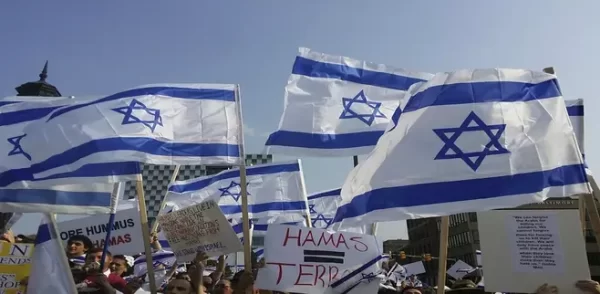
Attack On Civilians
Since the morning of October 7th, it was clear that this conflict was going to hurt civilians more than politicians and armies. Footage of Hamas militants gunning down Israelis in their own homes, kidnapping Israelis of all ages from the streets, and blatantly calling for the annihilation of the state of Israel. Images and accounts of murdered and kidnapped women, children, and other innocent civilians were widespread on every TV screen, news site, and radio station in the world. An attack by land, sea, and air, saw civilians struggling to hide, protect themselves, or seek proper shelter, as sirens rang throughout the cities. These terrorist acts sparked a declaration of war from the Prime Minister, Benjamin Netanyahu, and full retaliation from the Israeli Defense Forces, beginning with the immediate bombing of Hamas strongholds in Gaza, and later resulting in cutting off water and other essential resources into the Gaza territories.
Millions of Israelis are grieving for their friends, family, and even national identity, while also hiding and fighting for their lives amid continuing assaults and bombings by Hamas forces. Millions of Palestinians in Gaza now face a failing healthcare system, a depletion of resources, and a continued brutality from Hamas, Gaza’s majority governing power, and continued IDF retaliatory bombing. The toll on innocent women, children, and civilians in Israel and Gaza is the largest and most unacceptable consequence.
Distinctions: Gaza and Palestinians
The distinction between Hamas and Palestinians is an imperative one in this conflict. In the days following the attack, the largest cities in the world saw separate protests for the support of Israel and the support of Palestine. But in all the media coverage and publicity, misinformation has spread rampantly across even the most reliable of news sources. This ranges from the most basic kinds of misinformation, such as the fake story of Prime Minister Benjamin Netanyahu being hospitalized, to the most intricate and dangerous kinds, like the legitimization of Hamas. It’s important to understand the history amid such misinformation.
In 2006, Hamas won elections (supervised by the UN) for the government control of Gaza over their rival political party, the Fatah. Since then, the group has led hundreds of attacks on Israel, including suicide bombings and missile launchings. In 1997, the US and many of its global allies designated Hamas as a foreign terrorist organization. But the Palestinian people living under a Hamas government have suffered. Since the elections in Gaza, quality of life and any systems of public relations in Gaza have worsened, leaving only suffering Palestinians and a Hamas-stated goal to annihilate the State of Israel.
For years, Hamas has used Palestinians as human shields during Israeli retaliatory acts. Amid warnings from the Israeli Defense Forces to Palestinians of missile strikes, Hamas urged innocent Palestinian women and children to stay in their homes and facilities, ultimately paying the price for Hamas’ brutal terrorism. Last week’s attack is no different. Hamas will use Palestinians in further acts of disproportionate violence. Direct foreign funding into Hamas by states like Qatar has not been used to better the lives of Palestinians but rather used to build and plan heinous acts of terror. Palestinians, civilians in Gaza, deserve a government that is not run by Hamas, that doesn’t participate in global acts of terror, that wishes to coexist with its neighbors, and that allows for a freer and more tolerant way of life. When represented in the media, the phrase “Free Palestine” should not be used to support Hamas, but instead to find a new, more legitimate and less terroristic, government in Gaza for innocent Palestinian people.
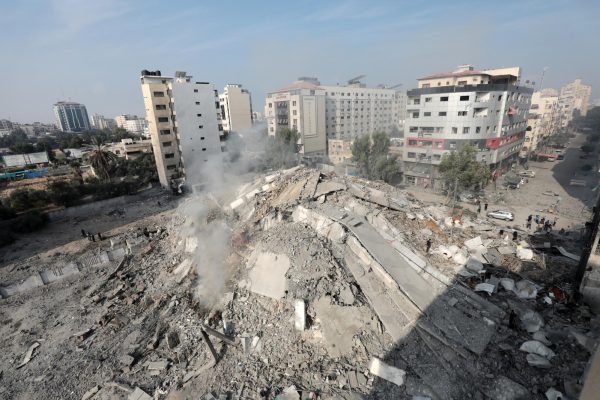
Distinctions: Israelis and Their Government
Palestinians aren’t the only civilians in this conflict who should be distinguished from their leaders. In fact, the recent relationship of Israelis with their government is one of the most controversial in the world. All this is in the midst of Prime Minister Netanyahu’s lowest approval numbers since his most recent taking of office. Netanyahu’s government was criticized for missing the oncoming attack in one of the “largest intelligence failures in history” (Intelligence has not yet spoken specifically on these events), with their concentration being severely scrutinized.
In just recent months, Israelis have taken to the streets to protest the massive judicial overhaul process supported by Netanyahu’s government and other far right activists. This change in power dynamics, restricting the judiciary, is a removal of essential checks and balances which create a free and democratized world. They’ve also protested about other unfair government practices which give more dominance to the far-right majority party. A sentiment the Israeli government has shown itself, while fighting in its defense, is it tends to be focused on the defense of its political situation over the lives of many civilians; a big distraction in the monitoring of Gaza and rises in terrorist activities. Amid disagreements and instability and steady loss of legitimacy in the government, the people of Israel also deserve a government which focuses on its needs and not its political gains.
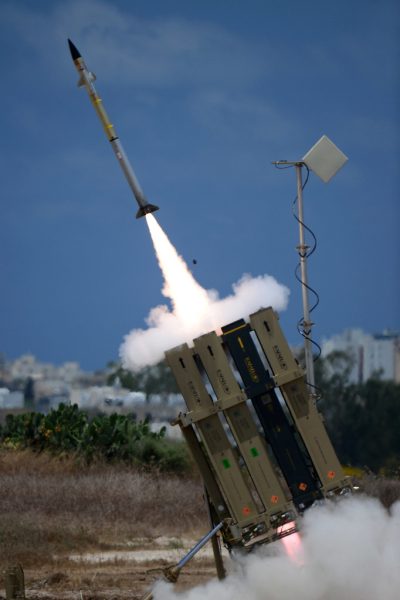
The biggest question is should Israel exercise restraint on retaliations into Gaza? The conflict has seen an immense human death toll and casualty count, garnering more media interest on how civilian life is impacted. With Gaza being one of the most densely populated cities in the world, Palestinian civilians are bound to suffer more during Israel’s time of fighting back. Additional important questions raised include: Where do Palestinians in Gaza go during Israeli strikes, and how to distinguish sole civilian populations from the Hamas usage of human shields? An uncontrolled retaliatory response could expand the conflict to surrounding Arab nations and potentially see the building of normal relations with Israel a thing of the past. The current blood of innocent civilians lost will grow rapidly if such a war sweeps on.
People want to live in peace, living their lives as part of everyday society, and not under the constant fear of being attacked. This quote from our initial article on the issue comes from a mother of hostages taken in the attack last Saturday, which inherently speaks to the reaction of innocent civilians in such a blatant attack. “Women, babies, children, elderly people, they have nothing to do with the war in Gaza. They have a big army to fight. If they want to fight, fight the army.”
Social Media, Mental Health, and The Emotional Toll
But perhaps most dangerously, people took to social media to voice their opinions on the matter. Platforms such as Instagram, Twitter, and Facebook all became homes for visceral feelings and endless opinions. The graphic visuals posted such as those by news organizations, Hamas, and even The State of Israel have also taken a toll on the mental health and emotions in our surrounding community.
You don’t have to have a connection to people in Israel or Gaza to be hurt by the events. You just need to be human. Israel being on the other side of the world has diminished the impact of such tragedy and violence on people in our community. However, it is imperative that in times of great sorrow and nuance, people stay informed, develop their opinion, and know to care for their neighbors and friends who could be affected.
-Michael Sigal & The Prospect Editorial Staff












